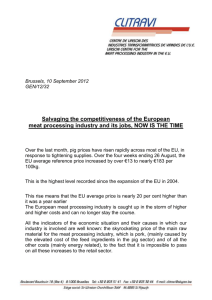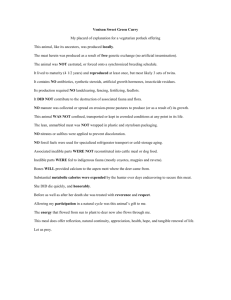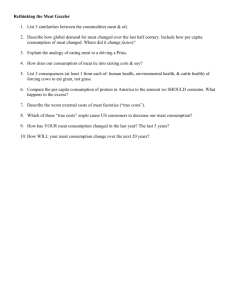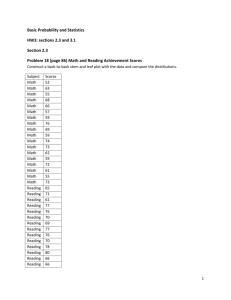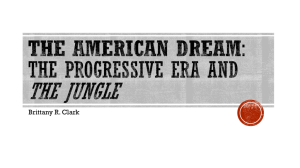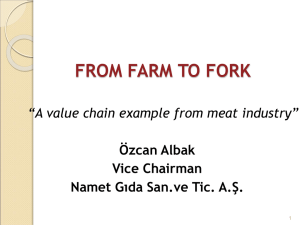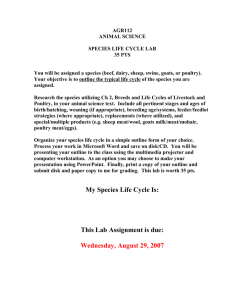Pub 209 wiki - HealthCultureAndSociety2013
advertisement
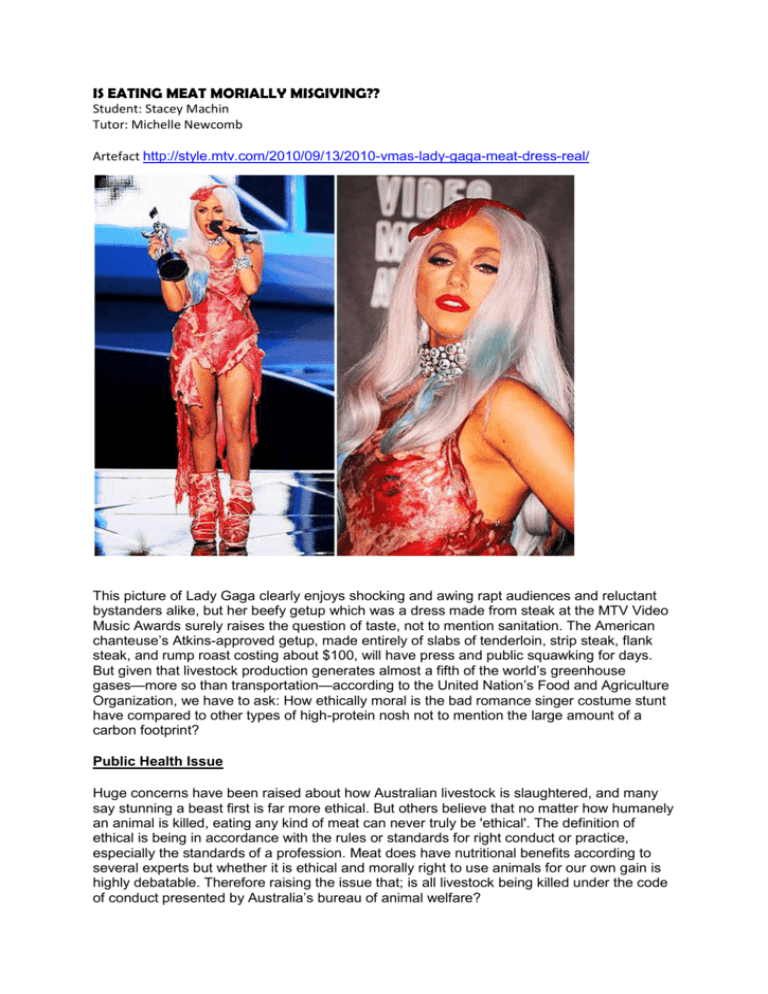
IS EATING MEAT MORIALLY MISGIVING?? Student: Stacey Machin Tutor: Michelle Newcomb Artefact http://style.mtv.com/2010/09/13/2010-vmas-lady-gaga-meat-dress-real/ This picture of Lady Gaga clearly enjoys shocking and awing rapt audiences and reluctant bystanders alike, but her beefy getup which was a dress made from steak at the MTV Video Music Awards surely raises the question of taste, not to mention sanitation. The American chanteuse’s Atkins-approved getup, made entirely of slabs of tenderloin, strip steak, flank steak, and rump roast costing about $100, will have press and public squawking for days. But given that livestock production generates almost a fifth of the world’s greenhouse gases—more so than transportation—according to the United Nation’s Food and Agriculture Organization, we have to ask: How ethically moral is the bad romance singer costume stunt have compared to other types of high-protein nosh not to mention the large amount of a carbon footprint? Public Health Issue Huge concerns have been raised about how Australian livestock is slaughtered, and many say stunning a beast first is far more ethical. But others believe that no matter how humanely an animal is killed, eating any kind of meat can never truly be 'ethical'. The definition of ethical is being in accordance with the rules or standards for right conduct or practice, especially the standards of a profession. Meat does have nutritional benefits according to several experts but whether it is ethical and morally right to use animals for our own gain is highly debatable. Therefore raising the issue that; is all livestock being killed under the code of conduct presented by Australia’s bureau of animal welfare? Literature review What's fine in one country can be considered shocking in others, depending on your cultural, ethical or religious beliefs. From foie grass to kangaroo, whale meat to shark-fin soup, dinner dishes and delicacies have long been the subject of heated debate (Insight, 2011). So how do different people justify eating one meat over another? Can any meat be deemed ‘more ethical’ than others? Meat-eating is a prime example of such a mindset. How can it be ethical to kill animals or give others permission to kill animals on their behalf simply to have the opportunity to eat parts of their bodies? There are so many alternatives and after all, meat-eating is a learned behaviour that can, with determination, be unlearned (Nelson, 2007. Pg13). Most meat-eaters are urban and have no idea of what horrors farm animals are doing to our environment and what animals are subjected to in their short lives, including those destined to end up on people's dinner plates. Throughout human history, food has been a central part of daily life, and across the globe, more money is spent on food than on any other major category (Ruby, M. B., & Heine, S. J. 2011). At the moment there are roughly 30 million cattle in Australia which is constantly increasing to be raised and killed for human consumption (Animal Australia, 2011). There are around 80,000 cattle properties in Australia, so that’s 80,000 families which are being supported along with the communities in which they are situated. Therefore to grow these cows there are several major environmental impacts that they produce. Most livestock are reared in industrialised production facilities, which produce over 500 litres of toxic methane per day which is about 20% of the world’s methane levels which also produces 22 times the green house impact of carbon dioxide. (Coffman, 2012) The production of meat requires a large range of machinery for factory processing, transportation of the livestock and also refrigeration resulting in per kilogram of beef that is consumed for example it is estimated that 40 kilograms of green house gases are produced! (Coffman, 2012). So not only does eating meat pose a major ethical question but the consumption of meat is posing a major threat to the environment in fact producing more than 130 times more waste than humans do (Coffman, 2012). Meat eaters can reduce their impact on the environment without giving it up altogether. One way of doing this is by choosing meat that has been farmed in an ethical manner using methods that nourish the animals and the environment. No matter how ethically animals have been raised during their life on the farm, they are still slaughtered and processed at the same abattoirs as factory farmed animals (Duncan& Morris, 2013). Although meat sold as certified organic in Australia must be processed at an abattoir which holds organic certification. They are also slaughtered many years before their natural lives would come to an end. Farmers who strive to raise their animals in the most ethical manner also want to see their ethical standards maintained throughout the slaughtering process presented by the bureau of animals making sure that feedlot cattle especially, that they be given their basic needs such as food, water, as well as the freedom to move, (Casoli &Duranti, 2005); however this is not always under their control (Duncan & Morris, 2013). Whether it is pigs locked in tiny pens or chickens sitting on wet litter, there are countless animal welfare issues surrounding the production of meat and eggs. Farmers, who produce free-range meat products, are horrified by the conditions in which some animals are raised and slaughtered as it is unnecessary and inhumane (Gillan, 2013). Choosing food products marked with the RSPCA's "Paw of Approval" at the supermarket is just one simple way to guarantee the meat and eggs that are being purchased from farms are prioritising animal welfare standards. Choosing certified organic meat is a way to ensure food is being raised under imperative humane conditions (Gillan, 2013). Organic products have a guarantee that there animals are free range for the entirety of their lives (Gillan, 2013). Certified organic farmers are audited annually to ensure the relevant processes are in place and undertaken correctly (Gillan, 2013). Trying to eat food that has not been produced at the environment's expense can be tricky. More consumers than ever are demanding ethical foods and its not uncommon to see people consulting apps and websites for information about the products they are buying (Gillan, 2013). Looking at marketing research, it's clear that people want humane products, such as free-range and grass-fed, according to Rachel Ankeny, an ethical food consumption researcher at the University of Adelaide. "It's partially due to cooking shows and those like The Biggest Loser. People are more aware of what they're eating." Farmers and supermarkets are heeding the message. "Retailers like Woolworths and Coles have developed lines, particularly in the animal-welfare domain, in response to consumer demand," Ankeny says. Humanity evolved eating animal foods and our bodies are suited to them. Therefore humans will continue to require the nutrients that animal products provide for the time being. However changing the way animals are treated to become a more humane and ethical standard as these animals provide products that are vital for our health and well being. In the meantime and as we continue our evolution we can choose to source and eat ethically raised meat. It may be more expensive and supermarkets are not likely to stock a wide range unless large numbers of people call for it. If we continue to eat meat, and most of us will in the foreseeable future, then we need to treat the animals that provide for us, with respect both in life and in death. Cultural and Social Analysis Animal suffering is a crucial element of factory farming that needs to be dramatically reduced or abolished in the near future. There are many social groups like RSPCA, Animals Australia and PETA who campaign to educate people about the animal cruelty of factory farms. Peter Singer and other philosophers who discuss the ethics of our treatment of animals believe that factory farming and the consumption of meat violates basic ethical principles. (Singer, 2013). The evolution of breeding and consuming beef has changed over time, due to the advancement of technology. The problems that arise while studying the consequences of animal cruelty in particular factory farming can be discussed from many angles and by many social theories. However Factory farming can be perceived as the ‘McDonaldization’ of traditional farming. With the current high demand for cheap meats being one of the leading purchases in supermarkets it mainly comes down to the theory of ‘Mcdonaldization’, a concept that can be applied to the beef industry in order to reach efficiency, calculability, and predictability to ultimately make a profit. This demand of efficiency has resulted into welfare issues for the cattle as Chavez quotes “the chains go so fast, it doesn’t give the animals enough time to die” (Chavez & Rodriguez, 2009 pg. 80) all for its sole purpose to make a maximise profit. Furthermore, capitalism and globalization have also played an important role in encouraging factory farming by suggesting that industrialized meat production is the only way to supply the current demand for meat, they have done this by encouraging the public to grow a taste for their products which therefore require their services (Smart, 1999). However, animal welfare organizations such as Animals Australia encourage the public to examine modern day meat production practices, which will hopefully make consumers reconsider their current meat consumption. They take a utilitarian approach and argue in favour that all conscious beings have the right to live a life without experiencing suffering or pain (Smart, 1999). Many other moral theories oppose the continuation of factory farming. They campaign for the moral case for vegetarianism and that animals should not be seen only in terms of what they can produce and nature needs to stop being viewed only as an object for use. The dangerous consequences of factory farming for the environment, human health, and farm animal welfare make of industrialized livestock production a serious problem that affects all social and cultural groups, where not even vegetarians and nonfactory farmed meat eaters are exempt. For these reasons awareness of this issue is crucial. Vegetarians are promoting four key principles that of the concern of animal welfare, concern for the environment, concern for human health and the disgust at the sensory qualities of meat being produced (Ruby & Heine, 2011). Therefore public health experts should be focusing on these particular areas as a result of this analysis to help this country’s millions of suffering farm animals. Analysis of Artefact Lady Gaga’s meat dress is a highly insulting item of clothing to be seen on a world stage seen by millions. Wearing a dress made from cuts of beef is seen to be extremely offensive to many who don’t understand what they call ‘a piece of art’. Lady Gaga was trying to make a statement however brewed up concerns of is it ethical to kill an animal for no purpose? From my personal perspective I have grown up eating meat as a norm, however seeing the dress produced feelings of disgust. Lady Gaga is a role model to some and wearing an article of clothing that was made out of animal flesh from who knows how many animals is something she should be ashamed of. The outrageous singer, I’m sure didn’t take into account the perspective of vegans and vegetarians defending animal rights. Where is the limit of artistic expression? Where does the line get drawn between survival needs or just a fashion statement? Because I defiantly don’t see this as a positive message to any age group or fans that it is ok to slaughter an animal to make anyone look ‘good’, Lady Gaga is a egotistical and highly unethical person in my eyes. References Animals Australia (2011). Cows. Retrieved from http://www.unleashed.org.au/animals/cows.php Casoli, C., Duranti, E., Cambiotti, F., & Avellini, P. (2005). Wild ungulate slaughtering and meat inspection. Veterinary Research Communications, 29, 89-95. doi:http://dx.doi.org/10.1007/s11259-005-0028-y Chavez, C. Rodriguez, J. (2010). Gristle: from factory farms to food safety. Co-edited Moby with Miyan Park, Workers (pp. 76-89). United States New York: The New York press. Duncan, C. and Morris, H. (2013) HUNGRY FOR INFO. Ethical Meat Suppliers. Retrieved from <http://www.sustainabletable.org.au/Hungryforinfo/EthicalMeatSuppliers/tabid/130/Default.as px>. Eating Meat. (2011) Overview : SBS Insight. Retrieved from <http://www.sbs.com.au/insight/episode/overview/420/Eating-Meat>. Gallin, Kimberly. (2013) How to Eat Ethically. Body + Soul. Retrieved from <http://www.bodyandsoul.com.au/nutrition/nutrition tips/how to eat ethically,18857>. Goffman, E. (2012). The Environmental impact of Meat. Retrieved from http://www.csa.com/discoveryguides/meat/review.pdf Lobato, Helen. (2011) The Ethics of Meat Eating. Indymedia Australia. Retrieved from <http://indymedia.org.au/2011/06/10/the-ethics-of-meat-eating-by-helen-lobato>. Meat-eating costs. (2007, Mar 14). The Nelson Mail. Retrieved from http://search.proquest.com/docview/274458243?accountid=13380 Ruby, M. B., & Heine, S. J. (2011). Meat, morals, and masculinity. Appetite, 56(2), 447-450. doi:10.1016/j.appet.2011.01.018 Smart, B. (1999). Resisting McDonaldization. London: Sage Publications Ethical. (2013) Dictionary.com. Dictionary.com. Retrieved from <http://dictionary.reference.com/browse/ethical>.
